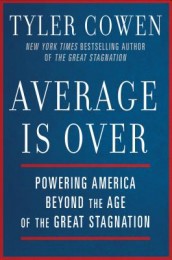How the Digital Divide is Helping to Drive Inequality

The New Yorker’s Joshua Rothman has an interview with our favorite (foodie) economist Tyler Cowen, who talks about his new book Average Is over, and why he thinks technology is one of the biggest culprits currently driving inequality in the U.S.:
In “Average Is Over,” you argue that inequality will grow in the U.S. for the next several decades. Why?
There are three main reasons inequality is here to stay, and will likely grow. The first is just measurement of worker value. We’re doing a lot to measure what workers are contributing to businesses, and, when you do that, very often you end up paying some people less and other people more. The second is automation — especially in terms of smart software. Today’s workplaces are often more complicated than, say, a factory for General Motors was in 1962. They require higher skills. People who have those skills are very often doing extremely well, but a lot of people don’t have them, and that increases inequality. And the third point is globalization. There’s a lot more unskilled labor in the world, and that creates downward pressure on unskilled labor in the United States. On the global level, inequality is down dramatically — we shouldn’t forget that. But within each country, or almost every country, inequality is up.
You think that intelligent software, especially, will make the labor market more unequal. Why is that the case?
Because of the cognitive requirements of working with smart software. And it’s also about training. There’s a big digital divide in this country.
Cowen also discusses geographic segregation of class (NYC and D.C. have become increasingly wealthier, while places like Texas are absorbing more poor people), and what a future middle class job may look like: “You read medical scans, and you work alongside a computer. The computer does most of the judging, but there are some special or unusual scans where you say, ‘Hmm, that’s not quite right — I need a doctor to look at this again and study it more carefully.’ You’ll need to know something about medicine, but it won’t be the same as being a doctor. You’ll need to know something about how these programs work, but it won’t be the same as being a programmer. You’ll need to be really good at judging, and being dispassionate, and you’ll have to have a sense of what computers can and cannot do. It’s about working with the machine: knowing when to hold back, when to intervene.”
Support The Billfold
The Billfold continues to exist thanks to support from our readers. Help us continue to do our work by making a monthly pledge on Patreon or a one-time-only contribution through PayPal.
Comments